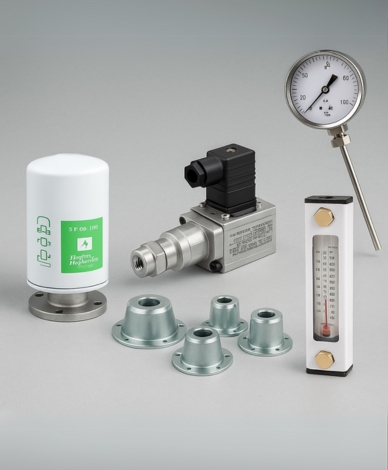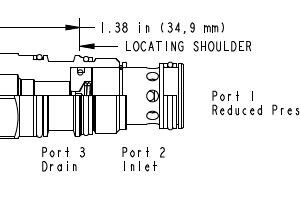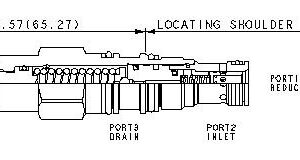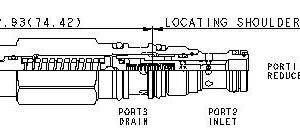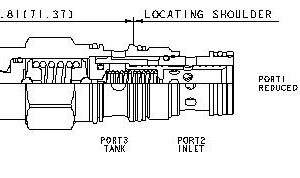SUN HYDRAULICS
Showing all 4 results
Filter-
SUN HYDRAULICS Pilot-operated, pressure reducing main stage with integral T-8A control cavity (PBFB8WN)
$479.53This valve is a normally open modulating element that incorporates an integral pilot control cavity. The pilot control cavity will accept any T-8A pressure control cartridge. The valve reduces a high primary pressure at the inlet (port 2) to a constant reduced pressure at port 1. The pilot cartridge’s setting determines the difference in pressure between reduced pressure (port 1) and the drain (port 3).
- All three-port pressure reducing and reducing/relieving cartridges are physically interchangeable (i.e. same flow path, same cavity for a given frame size). When considering mounting configurations, it is sometimes recommended that a full capacity return line (port 3) be used with reducing/relieving cartridges.
- Full reverse flow from reduced pressure (port 1) to inlet (port 2) may cause the main spool to close. If reverse free flow is required in the circuit, consider adding a separate check valve to the circuit.
- Main stage orifice is protected by a 150 micron stainless steel screen.
- Pilot operated valves exhibit very low dead-band transition between reducing and relieving modes.
-
SUN HYDRAULICS Pilot-operated, pressure reducing valve(PBBBLWN)
$287.16Pilot-operated, pressure reducing valves reduce a high primary pressure at the inlet (port 2) to a constant reduced pressure at port 1, allowing circuits with multiple pressure requirements to be operated using a single pump.
- Full reverse flow from reduced pressure (port 1) to inlet (port 2) may cause the main spool to close. If reverse free flow is required in the circuit, consider adding a separate check valve to the circuit.
- Minimum setting is 75 psi (5 bar) for all spring ranges.
- Pilot operated valves exhibit exceptionally flat pressure/flow characteristics, are very stable and have low hysteresis.
- Pressure at port 3 is directly additive to the valve setting at a 1:1 ratio and should not exceed 5000 psi (350 bar).
- Recommended maximum inlet pressure is determined by the adjustment range. Ranges A, B, N, and Q are tested with a 3000 psi (210 bar) maximum differential between inlet and reduced pressure. Range W is tested with 5000 psi (350 bar) of inlet pressure.
-
SUN HYDRAULICS Pilot-operated, pressure reducing/relieving valve(PPBBLAN)
$381.95Pilot-operated, pressure reducing/relieving valves reduce a high primary pressure at the inlet (port 2) to a constant reduced pressure at port 1, with a full-flow relief function from port 1 to tank (port 3).
- All three-port pressure reducing and reducing/relieving cartridges are physically interchangeable (i.e. same flow path, same cavity for a given frame size). When considering mounting configurations, it is sometimes recommended that a full capacity return line (port 3) be used with reducing/relieving cartridges.
- Full reverse flow from reduced pressure (port 1) to inlet (port 2) may cause the main spool to close. If reverse free flow is required in the circuit, consider adding a separate check valve to the circuit.
- If pilot flow consumption is critical, consider using direct acting reducing/relieving valves.
-
SUN HYDRAULICS Pilot-operated, pressure reducing/relieving valve(PPFBLAN)
$552.02Pilot-operated, pressure reducing/relieving valves reduce a high primary pressure at the inlet (port 2) to a constant reduced pressure at port 1, with a full-flow relief function from port 1 to tank (port 3).
- Pressure at port 3 is directly additive to the valve setting at a 1:1 ratio and should not exceed 3000 psi (210 bar).
- Maximum pressure at port 3 should be limited to 3000 psi (210 bar).
- Recommended maximum inlet pressure is determined by the adjustment range. Ranges D, E, N, and Q are tested with a 2000 psi (140 bar) maximum differential between inlet and reduced pressure. Ranges A, B, and H are tested with a 3000 psi (210 bar) maximum differential between inlet and reduced pressure. Ranges C and W are tested with 5000 psi (350 bar) of inlet pressure.
- Pilot operated valves exhibit exceptionally flat pressure/flow characteristics, are very stable and have low hysteresis.
